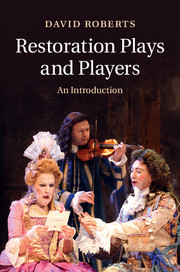4 - Companies
Published online by Cambridge University Press: 05 November 2014
Summary
Icons of metropolitan life, Restoration theatre companies were also (metaphorically) that more reassuring phenomenon, the family. They could certainly be as hospitable or as quarrelsome. In August 1673 the actor Philip Cademan had to play out a sword fight with foils in a revival of Davenant’s The Man’s the Master. His adversary, Henry Harris, accidentally caught him, piercing ‘near the eye, which so maimed both the hand and his speech, that he [could] make little use of either’. Cademan was Lady Davenant’s son from a former marriage, and the company’s response was generous: ‘[F]or which mischance,’ continues Downes, ‘he has received a pension ever since 1673, being 35 years ago.’ It was no mean sum: thirty shillings a week (about four times what a skilled craftsman earned), and only the intervention of the lawyer-manager Christopher Rich in the 1690s frog-marched Cademan back into the playhouse to earn his keep by selling tickets. The contrasting treatment of the injured actor in 1673 and 1695 said everything about the values of the old company and its new manager. No wonder Betterton complained that Rich dealt with his actors ‘not as we were the King’s and Queen’s servants but [Rich’s] slaves’.
The language of feudal indulgence masked the capacity of royal servants to behave like spoiled children. Ten years before accidentally maiming Cademan, Harris had gone on strike for more money and better roles, and got his way. The year before that he and Betterton (of all people) had been fined for assaulting the Master of the Revels’ messenger, who had demanded payment. Their indiscretions pale by comparison with the antics of the King’s Company actors during the 1670s, when senior actors made a habit of absence and theft, and even subcontracted their roles without telling management. When the Duke’s Company visited Oxford in 1670 it needed protection from unruly citizens; four years later it was the citizens who needed protection, the King’s Company ‘going about the town breaking of windows and committing many other unpardonable rudenesses’. Restoration theatre companies might look inwards for charity and mutual reliance, but once out on the town they could match any hooligan mob.
- Type
- Chapter
- Information
- Restoration Plays and PlayersAn Introduction, pp. 91 - 116Publisher: Cambridge University PressPrint publication year: 2014



